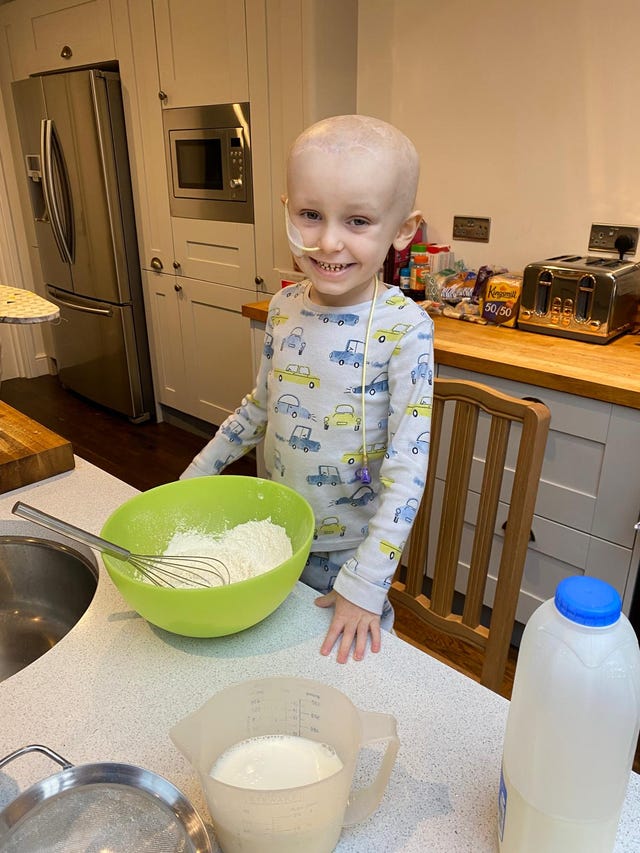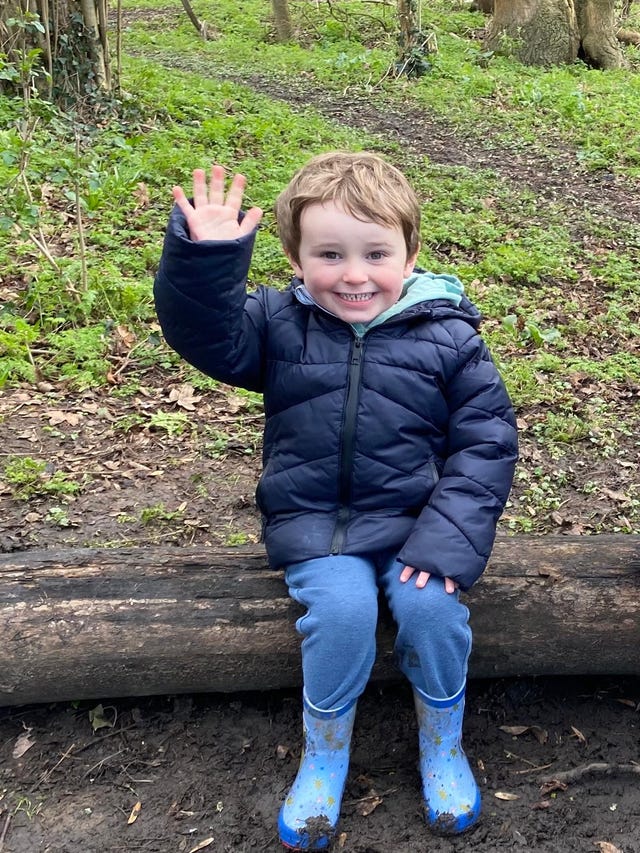Parents of brain tumour boy welcome study into kinder cancer care for children
Zac Staples died when he was just four years old.

A couple who lost their four-year-old son to a brain tumour have called for “kinder” treatments for children with cancer.
Zac Staples, from Gravesend in Kent, was diagnosed with a rare form of brain cancer in March 2021.
In the weeks and months that followed Zac had three operations, six weeks of proton beam therapy, and intense rounds of high-dose chemotherapy.
Now his family have called for more to be done to spare other families from the anguish of difficult cancer treatment for children.
Zac’s father, Luke Staples, told the PA news agency: “We hope research will mean that families don’t have to go through what we did.”
The 39-year-old added: “The loss of Zac is a hole that will never be filled.
“It’s always this element of ‘Why is he not here? He should be playing in the pool, he should be going to kids; clubs’.

“Hopefully new research will find a cure or at least a treatment that isn’t going to have such a detrimental effect on the child.”
Mr Staples and his wife Karen have welcomed news that The Brain Tumour Charity is investing £1.5 million into a new research project to better understand the rare cancer that Zac was diagnosed with – embryonal tumour with multi-layered rosettes.
It is hoped the project – a Europe-wide collaboration by medics in the field – will give a better understanding of the tumours and will lead to kinder treatments for children affected by these brain cancers.
These cancers are so rare that there is not enough data to know how often they occur.

The disease was first classified about 20 years ago and was formally recognised by the WHO in 2016.
The Staples family first realised there was a problem with jigsaw-loving Zac when he was three years and nine months old.
His mother, Karen Staples, told PA: “We noticed he’d been a bit sleepier than usual, that was increasing, and he was kind of zoning out a bit. And then we’d had a couple of instances of vomiting, just out of nowhere for no sort of real reason.”
A GP ordered blood tests but his worried parents called 111, which advised them to attend their local A&E.
He was rushed by ambulance from Darent Valley Hospital in Kent to King’s College Hospital in London, where he was operated on that evening.
Zac remained at King’s for a month and had two more operations which meant he had to re-learn how to walk and talk.
He then had six weeks of proton beam therapy followed by four rounds of high-dose chemotherapy at different treatment centres, with a view to curing the disease.
Mr Staples said the family were told that the proton beam therapy meant Zac would have been “unlikely to ever live independently” had he survived.

Mrs Staples, 39, said: “It is brutal on little ones.”
Zac was sent home for Christmas, but the family received the devastating news on New Year’s Eve that Zac’s tumour had returned.
“There wasn’t anything they could offer us other than palliative chemo,” she said.
After two rounds of palliative chemotherapy, doctors told the couple that the tumour was increasing in size and the decision was made to end treatment.

Mr Staples, who works in the electricity network industry, said: “Zac had more strength in his little finger than I had in my entire body, he just took everything on the chin.”
Mrs Staples, who works in banking, said she hopes the new research will mean in the future children with this rare form of brain cancer will have “as little residual damage as possible and minimal impacts to allow them to develop and have their own independence”.
The new research project will look at tumour biology, how the tumours behave and how they are currently treated. It will also create tumour models taken from patient samples to test different drugs in the laboratory, the charity said.
“It will also allow us to explore new, more effective and less toxic treatments.
“By establishing a pan-European registry for these tumours we will gather clinical, radiological and molecular information to develop up-to-date guidelines and clinical trials for this under-studied disease.
“We will also facilitate a European Tumour Board that will give expert guidance on the treatment of individual children, giving immediate benefit for those so desperately in need.”
Dr Simon Newman, chief scientific officer at The Brain Tumour Charity, said: “At The Brain Tumour Charity we are committed to funding the very best research to fulfil the unmet needs of the brain tumour community.
“This research will establish best practices for an under-studied group of tumours that devastate the lives of families and young children.
“We look forward to supporting a European-wide collaboration to tailor standard of care for children to improve survival and quality of life following a brain tumour diagnosis.”





